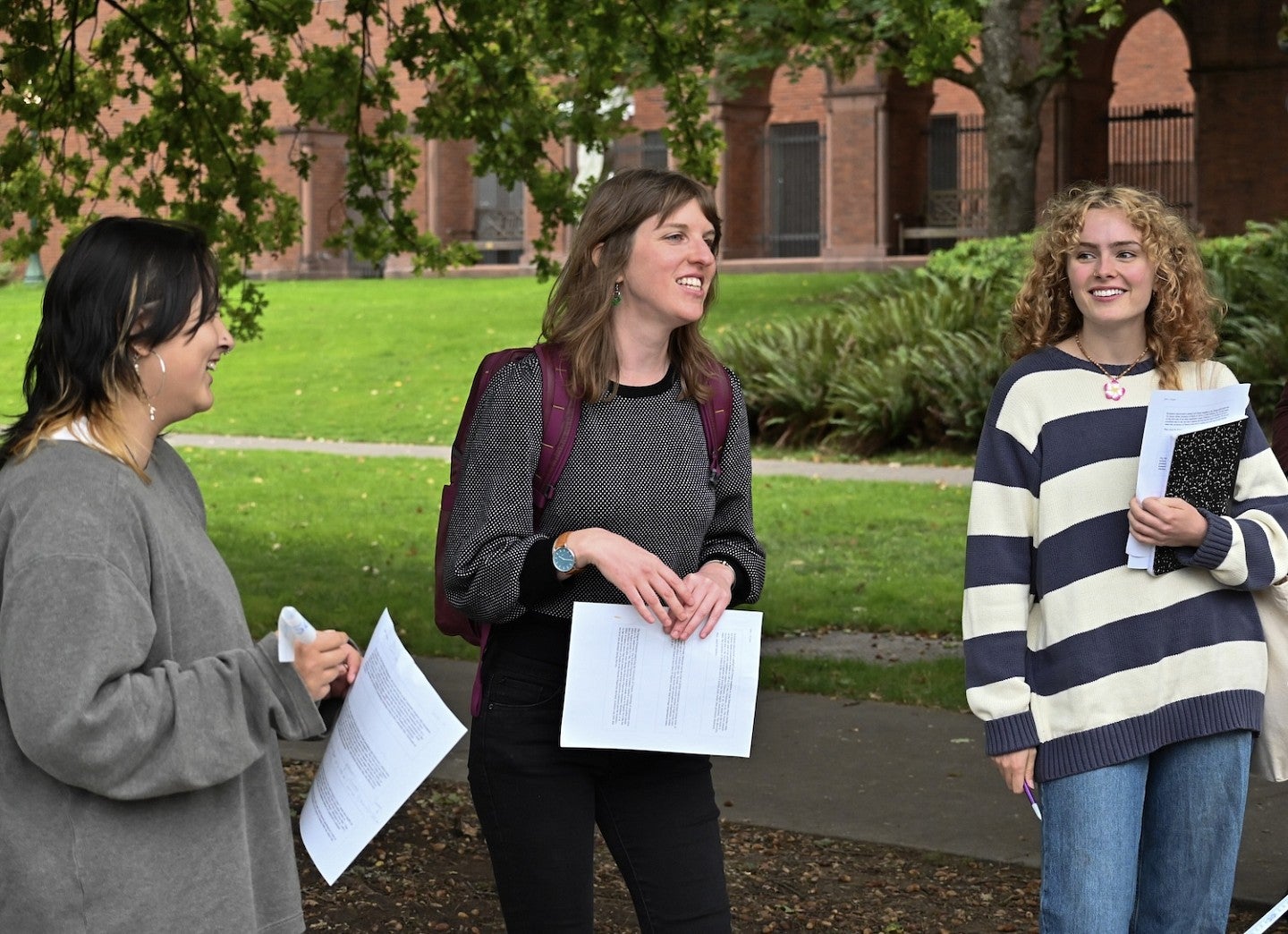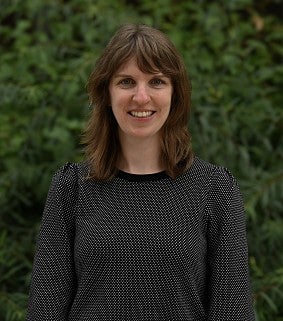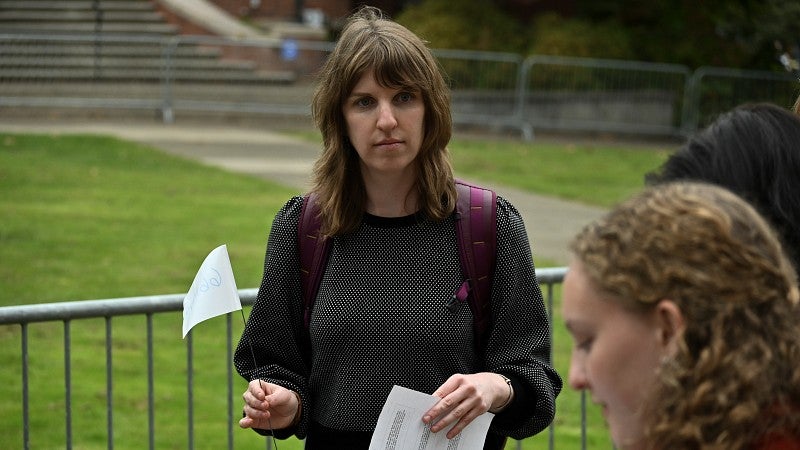
Finding her role

Favorite Movie: Fargo
Movie theater candy: Sour Patch Kids. But I also like going for popcorn to have as the meal.
How you spend your free time: Being with my dog and my fiancé, watching junk television and trying to learn languages.
Advice for students: Never be afraid of bragging about yourself. You’ve achieved a lot, so always represent what you’ve achieved.
Guilty pleasure: I love reading random Wikipedia pages. I have a bad habit of waking up at 2 a.m. and Wikipedia-ing the randomest stuff.
Coffee or Tea: Coffee, then more coffee, then tea.
Kristen Rahilly kneels next to some of her students along the sidewalk outside Chapman Hall, guiding them on where to place their measuring tape. They are making a living timeline of geologic history along the University of Oregon campus as part of a new Clark Honors College class.
In “HC 241: Geology of Campus,” Rahilly wants her students to bring in their own experiences to the class and learn from each other. And as a new instructor at the Honors College, she wants to be a model of encouragement so students understand that the natural sciences can be a home for anyone who is interested, especially women and others who haven’t always been represented in the field.
“You sort of feel it if you are a geology student, especially if you’re a female geology student,” she says. “You feel this need to keep up. I need to get to the top of the mountain and not be winded and make it seem like I totally got this, and I hate that. I think that is what completely keeps people out of science.”
It’s a position she’s taken before as someone who prides herself on being there for people in her world. Her students see it. Her younger twin siblings experienced it. And it is one of her core strengths, family members say.
“People’s wellbeing is in my responsibility a lot,” says Rahilly.
She grew up in Nashua, New Hampshire. Her father worked as a truck driver for Coca-Cola and her mother focused on the three kids until they were older. Then she worked at several different jobs – as the detention lady at Rahilly’s elementary school; as a housekeeper at a local university; and as an office secretary at Coca-Cola.
Her parents worked long hours, but always made sure to be there at the children’s sporting contests and concerts. Their dedication to family set an example for Rahilly at a young age, her father recalls.
“I remember when we stuffed all three kids into the back of my little Subaru hatchback,” Dan Rahilly recalls. “We drove all the way to Savannah, Georgia or something, but it was quite a way down and she kept (the twins) entertained, amazingly, the whole time.”
“There’s the stuff we’re trying to teach our students, but it’s more important what they take from the experience and if what they take from the experience is negativity and a lack of support, they’re never going to learn the science.”
Taking the lead
He remembers how Rahilly took the lead in all the neighborhood activities, creating made-up worlds for her siblings and their friends to play in.
When it came time to choose a college, Rahilly knew she wanted to stay close to home. She chose Smith College, an all-women’s university in Northampton, Massachussets, just a couple hours’ drive from her hometown.
“I remember, distinctly, my dad saying, ‘Well, you know, I couldn’t drop you off in the middle of the University of Oklahoma, because you like to be closer to home,’” she recalls. “I went to college and within a week, I was like: ‘I’m over it. I love it. I want to go more places.’”
She found a close-knit group of friends that she is still in touch with now. “It was a very inclusive environment, very welcoming, and I just felt very accepted,” she says.
After graduation, she moved to Fairbanks, Alaska to work on getting a master’s degree. It was a pivotal moment for her because she was so far from home. She struggled to find her way into science research.
“I went through this experience where my advisor was not very interested in my growth as a scientist and I think did a lot of damage to my self-confidence. (It) kind of shook my foundation a little bit,” she says.
She recalls feeling conflicted. She discovered a love for volcanoes but she didn’t see eye to eye with her advisor.
“It’s such a hard thing to feel invisible, especially when you don’t feel like the field is set up for your success to begin with,” she says. “I was surrounded by men (and feeling) like ‘Is this where I should be?’ And then having an advisor who was like ‘Yeah, maybe not.’”
She wanted to teach, so she signed up for the Mississippi Teacher Corps, where she was an eighth-grade science teacher in an under-resourced school. She ran into the same roadblocks with her advisor in Alaska, who didn’t seem interested in her future.
“He looked at me and sat me down and was like: ‘You’re going to go and make $30,000 a year teaching in rural Mississippi. Why?’” she remembers.
She didn’t give up, throwing herself into the work with her middle school students. She says it was one of the hardest jobs she ever had, but it was also the most beneficial. It was, she says, the “bootcamp of teaching.”
“It was really difficult, especially for me (from) growing up and being conflict averse,” she says now. “When you step into a middle school classroom, it’s like conflict every single hour.”
She followed the lead of other teachers and sought advice from administrators. She tried to keep tight control of her classroom by developing strict rules. It wasn’t her first reflex.
“I was told by the assistant superintendent of the district: ‘Don’t smile until October,’ and our classes started at the beginning of August,” she recalls. “That was so counter to my personality. It was so challenging. I followed that advice to the letter the first year, and my students hated my guts.”
Rahilly says that she wasn’t there for the students in the ways that they needed her to be and reflects on the experience with some regret.
“I actually think about that a lot because there’s the stuff we’re trying to teach our students, but it’s more important what they take from the experience,” she says. “If what they take from the experience is negativity and a lack of support, they’re never going to learn the sciences.”
She says she had several teachers in Mississippi who taught her that it was possible to show compassion and connect to students while maintaining control of the classroom. She redoubled her efforts to make sure school was a place for her students to want to be. She wanted them to feel safe.
“Working with those teachers was really amazing and it definitely propels me to try and teach in a way that’s going to positively impact students,” she says.

Losing someone close
She later moved to New Mexico to conduct research and pursue her PhD before becoming a lecturer at Columbia University in New York City. Her mother, who had battled cancer for almost a decade, entered hospice care in 2021. Rahilly returned home to help.
“I knew I would never be able to stop her, even though I said: ‘I got it handled,’” Dan Rahilly recalls. “It was good to have her.”
Her mother passed away a short time later.
After that experience, Kristen Rahilly worked at Oregon State University’s Center for Oldest Ice Exploration, supporting undergraduates who wanted to get into research. It was there that an assistant professor gave her an important piece of advice: “Nourish your compassionate impulses and your generous impulses as a teacher.”
At the Honors College, that’s what Rahilly is doing in her “Geology of Campus” class. The students spend time outdoors and are asked simply: “What do you see?”
If someone is lagging, Rahilly reassures them. She provides support. And she follows up. “Things like this happen all the time and you just adjust,” she says.
At a recent class in Eugene, Rahilly gives the students time to gather information and then stands with a small white board in front of them. She writes down some instructions and then encourages them to look for more geological information.
Sierra Hawes is an educational foundations major and Sierra Matz is a psychology major. Neither are familiar with geology. Both say Rahilly’s teaching caters to a variety of different learning styles.
“She does a good job having various kinds of assignments,” Matz says. “It’s very immersive and makes us feel like we’re actual geologists.”
That reaction shows Rahilly that she’s making progress on her goal to make her field inclusive.
“Making it so we don’t have to go into remote locations, where we can find what we need to find to learn the content of geology right here on campus,” she says. It “makes it very safe, inclusive, and welcoming.”
